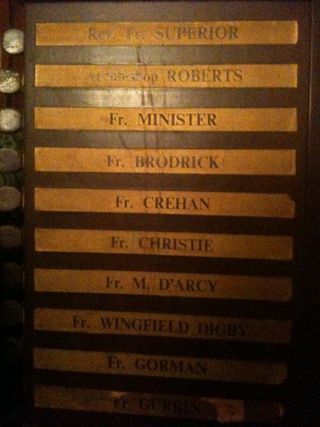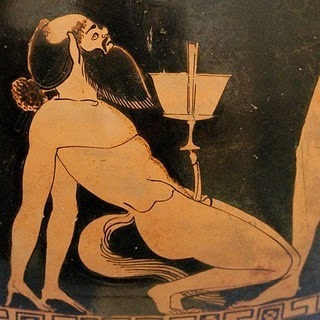Mary Beard's Blog, page 72
December 4, 2010
Student occupation: the dilemmas

OK -- as the editor and others have pointed out following my last post, having an awful lot of teaching to do is not much of an excuse for failing to get my hands dirty down at the occupation at the Old Schools. ("Where were you when the revolution needed you Beard...?" "Teaching, Sir...")
But that is just one of the paradoxes of this kind of political action.
I mean, if the students are protesting (in part) in order to save the study of Arts and Humanities from the forces of darkness, then there would have been something self destructive in giving up the teaching of said subjects, just to join in at the Senate House.
And especially this week, when I was seeing all the third years for whom I Direct Studies, one by one, as well as checking in with those whose undergraduate theses I am supervising, squeezing in the last essay supervision of the term with everyone else, and making sure that the MPhils got their first assessed essays in in time ... etc etc . (If you ever hear any Mum or Dad complain that their kid is not getting the hands-on treatment at Uni that they expected -- dont believe it; at least not for Classics in Cambridge.)
Anyway, this all coincided with the longlisting meeting for our college junior research fellowship competition -- which meant reading carefully through 218 applications to pick out fewer than 20 to go to the next stage (in the end we have only one position to give). You can do the calculations for yourself. Just imagine I took the bare minimum of 10 minutes per application (and that would have been a cracking pace) -- it would have taken 36 hours solid... Which indeed it did, and more.
But there are other strange anomalies. And the biggest of those is the very nature of the law breaking and transgression that the occupation implies.
Let me repeat that, politically, I am absolutely on the side of the students; they are standing up for a load of principles in which I believe. And I hope that the University lets them off very lightly indeed, and gets down to talk to them about the issues and dilemmas we are facing. For the students are our greatest allies.(They have a General Assembly on Sunday at 1.00, open to all, to discuss the next step.)
But, all the same, there is something illogical in thinking (as some of my colleagues seem to do) that any threat of punishment or legal action is merely an example of the oppressive and vindictive power of establishment authority being wreaked on the innocent.
After all the students are occupying a place in contravention of custom, rule and law. That's the whole point. You cant "occupy" somewhere (like a JCR, or Students' Union) where you are allowed to be anyway. It HAS to be transgressive; and so it has to attract the attention (yes, and even the threats) of the authorities and the police, who in their turn have to make it clear that transgression is taking place. Otherwise it's more like a sleepover than a protest.
There is, in other words, a symbiosis here between action and reaction, protest and punishment, that goes unnoticed in many of the cries of anguish we are now hearing about the authorities' tough line.
It reminds me of when my son, a sixthformer, bunked off school to march against the Iraq war. I was dead proud of him. Then the school rang to say that he had been absent without leave.
Yes, I said, and I hope that you will be punishing him. No, came the reply, he is very sincere.
Sincere or not, I thought, there was a lesson to be learned here. If you want to protest, that's fine, but you have to feel the pinch -- otherwise it's too risk-free, and you are being smothered in well-meaning paternalism ("Off you go and march now/occupy the Old Schools...just so long as you are 'sincere'")
In my son's case, I would have had him do 500 lines: "Mr Blair is wrong to go to war on Iraq" 500 times over would, I think, have been an appropriate punishment in the circumstances.
For our students, I would pat them on the back, give them a very big cheer and a party -- then I would have them give 20 hours to a telephone campaign raising money for Arts and Humanities, or writing begging letters to old boys and girls explaining why they had occupied the Old Schools, why it was important to them, and why a bit of cash would help.
It's called making the "punishment" fit the "crime"
December 1, 2010
Students occupy the Senate House

As I write, the Student Occupation of the Senate House in Cambridge is entering its sixth day. To be precise they are occupying the University Combination Room -- which is a wise decision, as it is a large room, has a lot of comfy chairs, a controversial lift and wont be much missed by most working senior members of the university, who haven't got a minute to take a coffee break/lunch there anyway.
They are protesting against the now usual combination of "fees and cuts". Am I on their side?

Well, in one way, of course I am. It would be worrying if the students (and sixth formers with some eye on the future) didn't see what government proposals were likely to do to higher education, to the realistic chances of the less well off going to university (the coalition can go on till it's blue in the face about how there is nothing to pay up front, but the likelihood is that £30-40k of debt will put off many of the kids we want to attract), and to strength of Arts and Humanities in particular (which cant possible operate successfully on a supply and demand model).So, yes, they are right to make a fuss.
And anyone who looks at what the students have been doing in the Combination Room can hardly help but be touched: vegan meals, poetry readings, improving lectures, art-house movies and a good deal of essay writing. In those terms, and lets hope this continues, it's a model of student protest. If I was thirty years younger (and didn't have getting on for 20 hours teaching to be done in the rest of this week), I'd be there.
My only worry is what it is actually going to achieve, and who is to be convinced about what. And more generally, what the academic community in general should be doing to get their point across most effectively about this damage that is being done.
The students are trying to convince the university authorities. But, by and large, the authorities are broadly on the same side as the students (even if they have rather different ways of getting there). And the full range of student demands are probably not something any authorities could agree to anyway, not to the letter ("That the university declare it will never privatise" ... never say never). Interestingly the supporting letter from academics (which I have just signed) stops far short of backing the full student manifesto: the letters asks the university to "take note" of the student demands, and the Vice-Chancellor to express opposition to the current government's destructive agenda.
But on the other hand, what are they supposed to do? If they have a peaceful little march through the city centre and go back to their rooms, then the government pats itself on the back for smiling benevolently on the citizens' right to peaceful protest, and takes not a blind bit of notice.
So what is the right answer? I'm not sure. There have been some good things said in television debates about what the reforms will mean for arts and humanities (close to death, being the answer) .. but our spokespeople do tend to look like rather languid Oxbridge types.
And some of us did send a letter to the Telegraph, which you can read here. The Tory party paper of choice, let's hope someone reads it.
November 27, 2010
My gold-plated pension scheme?

It's funny how the meanings of words can chance so quickly. I always thought that "gold-plated" pensions were a great idea. Only a few years ago they were about ensuring that people who had worked hard for nigh on half a century could live comfortably when they retired; they were the end of old-age poverty . . . and indeed were probably cheap at the price, given the expense to the nation (in terms of the NHS, social services etc) of the elderly slipping to the bottom of the deprivation pile.
Now the phrase conjures up an image of a load of geriatric fat-cats, passing their retirements in the lap of luxury, at (horrible phrase) "the tax-payer's expense" -- while the toiling masses labour on low pay to keep them in this privileged condition.
Many people would say that I had a pretty gold-plated pension (paying out up to half my annual salary, based on the average of what I earned in my final three years, and index linked to the RPI). But it isnt at the tax-payer's expense... the Universities Superannuation Scheme is a company, and it is funded by the contributions of both employees and employers.
Gold-plated until now, that is. Because in view of what is believed to be the unsustainability of the scheme at its current levels of benefits (for all the usual reasons). The proposals include moving to a Career Average basis of pension calculation (that is what you get is based on your mean salary throughout your whole career...."mean" in mathematical sense, that is), and the index-linking will move from the Retail Price Index to the Consumer Price Index (which is traditionally lower) -- and anyway even that is capped at 5% per annum. Calculations show that this could amount to very significant losses (for example, if you lived 20 years in a period of high inflation, your annual pension at aged 85 would be worth less than 20% of your final salary). There are more examples given here in an excellent paper by Susan Cooper and Stephen Cowley.
There is a good deal of anger amongst us employees about this. Not because anyone thinks that no changes should be made. But because we have simply not been consulted as we should have been, and the different options (with supporting arguments have not been laid out). We're just having one way forward forced upon us.
For my own part, I would like to see what it would cost to keep the benefits roughly as they are. How much more would I have to pay (many of us would pay a very great deal more to protect our pensions)? And how much more could, or would, the employers contribute to the pot? Ironically, in the apparent stability of the late 1990s, the employers actually reduced their contribution to the scheme. Why not put that back up to its traditional levels?
To be fair to the Univesity of Cambridge, they have tried to get the information we want out of the managers of the scheme. But without much success. So there is now to be a ballot of the Regent House here in Cambridge (that's "the don's parliament") asking the university to demand to see the information on the alternatives from USS, and to conduct a ballot.
One of the things that is bothering me is the Career Average idea. I know what the arguments in favour are: why should people who have a big salary hike at the end of their career benefit from that for ever? But isnt there also a gender point? In Cambridge, and many other universities I think, women -- as a group -- are promoted later than men. Even those who do get to the top salary grades, get there later than their male colleagues (why? we dont really know, but babies, domestic responsibilities and a dash of institutional sexism must all play some part..). A Final Salary scheme compensates for that. A Career Average scheme will make them the economic victims of that slower salary progression for their whole lives, right through their retirement.
These are the kind of things that we want to have a chance to discuss properly.
November 23, 2010
Classics for all

Everyone seems to be claiming to support Latin in schools these days. Last week on Any Questions the last question was "What place do ancient languages, such as Latin, Greek and even Pictish have in a modern education system?"
In the old days (about 5 years ago, I mean) you could have relied upon some philistine MP from either side of the house to come out and say what a waste of time Latin and Greek were...toff subjects that should be quietly allowed to die (if not be speedily put down), and be replaced by something useful like Computer Studies or Physics.
No such thing on Friday, every panellist have a pretty warm feelings for Latin (even if not Pictish). Simon Heffer was all for having Latin and maybe Greek taught in every school in the land (with some supporting evidence from Matthew Arnold). Predictable enough maybe. But John Denham, the Labour front bencher, also said that he thought there were some things that were worth doing simply because they were intellectually interesting-- and said that Latin should be available in all good comprehensives. And Viv Groskop sung the praises of Pictish and said that Latin had served her very well.. "a fundamental part of education". Only the Transport Secretary, Philip Hammond, did not explicitly put his vote on the right side, but his discussion of Icelandic implicitly tended in that direction.
In fact, so widespread is the feeling in favour of Classics that the rumour is that the Today Programme had to scratch an interview with Classics-fan Bettany Hughes, because they couldn't find anyone to go on air and dump on the subject.
So far so good. But it is one thing to claim how much you love Latin and Greek; quite another to find the cash so that kids at most schools in the land can actually study them.
That's where a new campaign called "Classics For All" comes in.
Declaration of interest here: I am an Hon Patron of this organisation. And a jolly good thing it is too. The aim is to raise a large amount of money to support teaching and other classical initiatives in state schools. Classics for All will not be doing the teaching, but administering grants to kick start projects that "will meet or stimulate demand for Classics in a school or area"... from after school clubs, to GCSE classes, using teachers wherever they can be found.
It's only just launched, but you can click here for the website and will soon be able to contribute online (in the meantime you could always send a cheque).
There's a more general point about Humanities funding here. It is much harder for us to get a hearing when the government line is how wonderful History, English, Theology or whatever are... but that sadly (ministerial tear in the eye at this point), when so many people are being asked to tighten their belts, Humanities are realy not something that can be funded out of public money.
That kind of argument puts us on the back foot. But the truth is that Humanities have never thrived on private enterprise; they have always needed the state, the monarch or the church. So all power to our students who are having a (peaceful) demonstration in Cambridge tomorrow.
November 16, 2010
Dominus custodiat introitum tuum et exitum tuum
 I might as well 'fess up to our latest little auction purchase -- especially as it continues the recent churchy theme, and as I need a bit of help in pinpointing its provenance.
I might as well 'fess up to our latest little auction purchase -- especially as it continues the recent churchy theme, and as I need a bit of help in pinpointing its provenance.
It is, as you can see, an "In or Out? board" from some Jesuit college or seminary (or so I judge from the Jesuit motto "Ad Maiorem Dei Gloriam" abbreviated at the top). It has a list of names below (Archbishop Roberts, Fr Brodrick, Fr Crehan and so forth) and you pull out a sliding knob at the side, to reveal the "out" sign.
Just below AMDG is what I take to be a Jesuitical joke..."May the Lord guard your coming and your going" is taken from the Office for the Dead. "Coming" and "going" in the original meaning "birth" and "death" -- not, as here, "goiing out" to the shops, or whatever.
I liked that. But noone else did apparently, as the poor thing failed to reach its reserve price, and we bought it after the sale for its lowest estimate. The truth was we had actually put a higher bid in by fax, but for some reason the fax hadnt got through -- so in my terms it was a, sort of, bargain.
But where is it from? That's where I need your help.

To judge from the names and matching them up with Jesuit places, I have come to the conclusion that it was once in Campion Hall, Oxford. Can anyone confirm?
As for other interior decor news, I can report that the bath has made its journey downstairs -- and it is now waiting for installation in the new bathromm. (Sorry Lord Truth, not the photo you have been waiting for.)
November 13, 2010
The cardinal's hat

I think I have half made my peace with the Church today. Last weekend I went on the Today programme (an inadvertent blackleg -- I hadnt realised the NUJ strike went till Saturday, until I woke up to find that Farming Today had been replaced by a repeat); the, slightly self-referential, subject of the discussion was what life had been like last Friday without the Today programme (which was then itself off the air because of strikes).
Steve Richards, a loqacious journalist from the Independent, had loved it -- said that it made the day feel like Christmas. I, on the other hand, had felt distinctly nervous. I have never thought I was much interested in the rise and fall of BP shares, or the likely winner at Wincanton, but if all this stuff is NOT broadcast, I suddenly find that I really want to know. Having no Today programme was not like Christmas, it was like Sunday morning -- a real blot on the Radio 4 escutcheon, when (as I perhaps unwisely put it) we get that awful happy clappy Sunday Worship.
There was an instant torrent of email. Some said they were prepared to join in the fight for a Sunday Worship free Sunday morning. Others (and it was just about evenly divided) were accusing me of intolerance and irreligion -- many in polite and well argued comment, others in tones of which I think the Almighty would probably seriously disapprove.
I wrote back to all of the emailers, explaining that I was actually a great fan of SOME religion on radio, but in my view Sunday Worship hit rock bottom. And, of course, the most insulting didnt bother even to acknowledge my reply....so much for the spirit of tolerance and interfaith understanding.
Well I hope they are eating their words this morning.
Because by the time I appeared on the radio to share my views on happy clappy religion, I had already chosen my favourite photograph of the decade to appear in the Guardian. Honestly, I was at a bit of a loss. There were plenty of moving images in the books they sent to choose from, but I thought that I wanted to do something a bit different from human tragedy, the Iraq War or Huntingdon Life Sciences -- so I went for the picture at the top, of the cardinals at the funeral of John Paul II. The line was, as you can read here, that it would be dead easy to mock...but that the working ritual is a bit more complex than such mockery (on the Dawkins line) would suggest. Imagine for a start the jokes of these guys when they put their feet up later that evening round the Vatican fire, with a glass of the Vatican Benedictine. I was meaning to suggest that 'designer atheism' had got it all a bit too simple.
So much for Beard the hater of organised religion.
You can see the other choices here, and read me (if you have the stomach for more) on the Neil  MacGregor book.
MacGregor book.
I am on the way back from Bochum by the way... it has rained non stop since I got here (see right), but I have had good fun in my 5 hours at the Memory-Fest. Thanks to all who gave be a good time.
November 11, 2010
Roman Memory

I am off to Bochum tomorrow to give a paper at a conference on Roman Memory. It is a mad excursion in the middle of term, and I have been working at ungodly hours (even on Beard standards, whose working hours would in a usual week displease the Lord, I imagine). The mitigating factor is that I will have one night in a hotel with a fully working bathroom, hair washing and drying facilities etc.
The new bathrooms at Beard/Cormack Towers are coming on apace and we already have a brand new working shower, but the lovely original Victorian bath is still on the top landing waiting to be transferred to the new bathroom a floor below. It has been, as you will see, painted a jolly blue colour, and on Tuesday will be heaved downstairs. The builder is worried a) if he is strong enough to take it and has got a few more guys in to help (they think four of them should do it) and b) whether the stairs are strong enough to take the weight, of it and them -- so is proposing to jack them up to be on the safe side. I have decided that it will be better to be out that day.
Anyway, the conference is part of a big project, but I am only giving a retrospect on a paper I wrote 25 years ago ("No more sheep on Romulus' birthday" it was called, and it was about the way in which the ancient Roman ritual calendar operated to re-present different versions of Roman time, in a fluid, shifting, constantly re-negotiated pageant -- that's the simple version). It's the kind of gig you get asked to do when you are 50 plus.
Going back to old work is always an eye-opener, and almost always a funny mixture of self-satisfaction on the one hand and 'how could I ever have written that?' on the other. In this case the retrospect has caused me to catch up with some of the mountains of recent work on cultural memory. Much of it is very good idea (and I really enjoyed reconnecting with the writing of Paul Connerton), but there is something a bit unnerving about a whole area of the humanities that appears to think that cultural memory is a very good thing. Like Connerton (who has recently written on "Seven types of forgetting"), I found myself longing for a bit of oblivion.
Anyway, the end of this new paper will ask how Roman ritual might have contributed to cultural amnesia rather than cultural memory -- not sure I have an answer to that, but let's see.
November 9, 2010
The House of the Gladiators at Pompeii?

OK -- you've been asking for my thoughts on the collapse of the House of the Gladiators at Pompeii. So here we go.
I am sure that one of the reasons that it has got so much media attention is the "Gladiators" bit (on the iron law of journalism that that word "gladiator" gets you ten times as many readers as just mere "Romans").But we have to forget all that. There is no reason at all to connect this house to any gladiators, ever. Still less to imagine, as the Telegraph has it, that "it would have been the residence for gladiators in Pompeii". The truth is that we dont know what this building was. The only clue is that there were cupboards found inside (though not actually containing weapons, as is often claimed -- for the reliable story on this, go to the excellent Blogging Pompeii site).And the painted decoration is full of weapons and figures of Victory etc. It used to be thought to be the HQ of the city's youth organisation; others have thought -- I seem to remember -- that it was a record office of some sort. But there's no reason to believe any of these ideas.
And why has it just collapsed?
The world's press has pointed fingers at the Pompeii archaeological authorities, with cries of neglect etc. But there is more to it than that.
For as start, it ill behoves the British to wring their hands over this little building. After all, we bombed it in World War II. What has collapsed is in fact the reconstruction of the building that was put up after that.
Besides, as Jo Berry fully explains in Blogging Pompeii, this part of the site has a big structural problem which is nothing at all to do with neglect. It has a great wedge of unexcavated land behind it, which puts a hell of a pressure on the houses at its edges.
It is not something that will be solved by putting the site in private hands; quite the reverse in fact.
November 5, 2010
Greek pots: the naughty bits

One of my favourite "Greek Pot" stories is about this satyr -- who features on a psykter (or wine cooler) decorated, as these pots usually are, around its bulbous body.The idea was, you put the wine in the cooler, and then plunged the whole thing into cold water in an even bigger vessel (a krater, or mixing  dish) and waited till the wine was nicely chilled.
dish) and waited till the wine was nicely chilled.
This one is by Douris, who worked in Athens in the early fifth century, and it's in the British Museum. It shows the wild drunken, goaty satyrs having a characteristically good time... the sort of over the top, out of control partying that the human users of the psykter would fantasize about, but not actually engage in (being civilised men not wild goaty satyrs, if you see what I mean).
Anyway for many years the scene that I have put at the top of this post was completely incomprehensible, as some bowdlerising curator had carefully painted out the willy. So instead of the satyr balancing a cup on his erect penis (an amazing enough feat in itself), he appeared to be leaning back expectantly, while the cup hovered miraculously above him, in mid air.
The painting has now been removed, many years ago in fact, and if you go to the British Museum to see the pot today, these satyrical japes make some sense again (at least the pot has something to balance on).
You would have though that the days of such expurgation were over, but it seems they are not. This week our archaeology seminar had a paper on "Ionian Art and Identity" given by a colleague from Liverpool. Now I must confess that I couldn't go to the seminar, so I rely on second hand accounts (including the husband's). But it seems that the most memorable aspect of the occasion for some of those who did go was the expurgated slide. One of the images shown was of a similarly raunchy Greek pot: it had a concealing 'star' over the genitals (and the husband thought that the eyes had had similar treatment, like in a modern newspaper, but couldn't be sure). The speaker said that his university demanded this for student lectures. To protect the young.
Was this a joke? (That was my instinct when I heard the story...) Or could it really be true -- another bit of University administration gone completely mad.
November 1, 2010
Retail -- what therapy?

I knew that the 60 minutes shopping time I had was not going to go well when I was arraigned on my bike by the Police Constable.
I was in a hurry, but I did need some long garment to go to a 'white tie' dinner on Thursday. The Don's view is that if it says 'dinner jackets', you can get away with leggings and a sparkly top -- but 'white tie' means a skirt (which I dont really have).
So off I went to shop. The first mishap was the said police constable. At the bottom of Sidgwick Avenue, going into town from college, is a traffic light, which lets pedestrians through between the lights on a beeping sound. Every cyclist in the world goes with the pedestrians, illegally as it may be. On this occasion a charming policeman was waiting for us... extremely annoying, and full marks to him. He said pretty quickly that he wasnt going to give his four victims a ticket ('what would be the point?" he asked).. but he did look us in the eye and tell us to obey the rules of the road.
I gave him full marks, and fair cop; in fact I didn't jump the lights at another favourite spot later (which just goes to show that community policing, and a bit of embarrassment can be more effective that a ticket -- so keep it up Cambridge Constabulary).
But the search for a long skirt was much worse.
My favourite shop (Troon) had nothing -- dont even bother to look, they confessed. They suggested I go to something called the Tailor's Cat (bridal plus evening wear), but that was shut on a Monday. The next door shop to Troon thought that M and S was the only place they knew that did long frocks...and all I saw in French Connection made me look the wrong side of 90. So where do people buy long dresses?
As I refected on that, I decided to buy some comfort on the way home. I fancied some new Parmesan, so went into the Cambridge Cheese Shop. These guys have great cheese but are never quick at the best of times. On this occasion they were slower than ever, taking a good 10 minutes to cut a small slice of Parmesan and Vignotte. While I was there, I decided to have some tomatoes and mozzarella... and after twenty minutes produced my card. "Oh" said the slow man, "we cant take cards today -- our machine s down".
At this point I could have gone round to the cashpoint. But, sod it, I thought.. I have waited 20 minutes, and have been coming to this shop since it opened, more than a decade ago. So "I cut off my nose to spite my face" and told him to put his sodding cheese back (heavens - this shop has a notice saying that it charges 50p for any card trarsaction; surely they could have added a sign sayimg 'no cards today").
And I went home wondering where I would get the long skirt tomorrow. Any suggestions?
Mary Beard's Blog
- Mary Beard's profile
- 4110 followers




